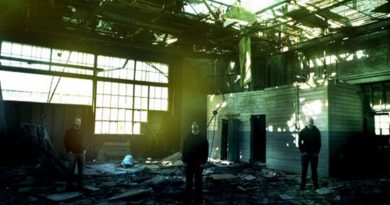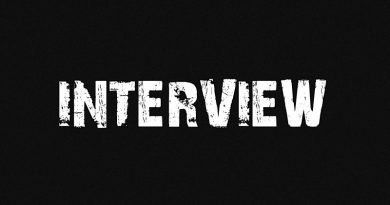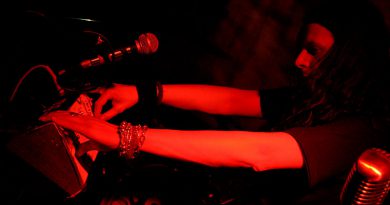In Search Of Tone: Olivier Verron & Frédéric Patte-Brasseur Of Conviction
Conviction were introduced to me after starting this project. It’s one of the best perks, being able to learn about new amazing bands and meet such kind and passionate people. Conviction is no exception to this. Olivier Verron and Frédéric Patte-Brasseur are two outstanding guitar players with an incredible amount of knowledge. Frédéric also is a skilled luthier so he’s probably forgotten more than I know as it took me a few years to finally get new pickups in my guitar (embarrassing, I know – haha).
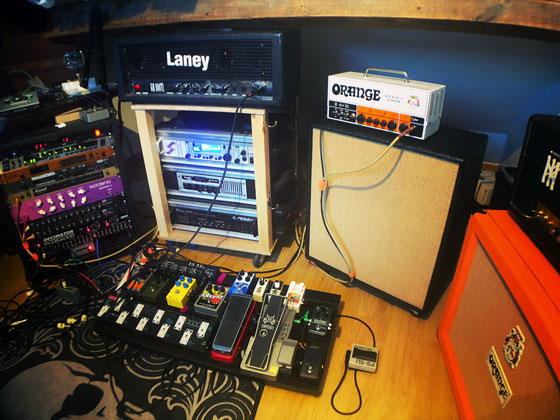
As for Conviction, they’re a hard hitting band that creates some phenomenal tones. They craft their songs to perfection through emotion that can be felt as you listen. Their debut album was reviewed by fellow Shaman scribe Jamie Grimes back in January, it’s a must read, and listen as he states… ’true doom done right.’
I find that you guys have a very unique distorted tone. Songs like Voices Of The Dead and Wrong Life really showcase that well. When getting this epic tone, what kind of amps are you both using?
Frédéric: Hello! Well, the idea was to create a genuine wall of amps, and so we did, using part of my own amp collection as well as Olivier’s own amp. We both recorded two rhythm tracks each, that, thanks to a plugin written by my friend Ivan at Musical Enthropy, became a real ‘DI guitar choir’.
We then used it to feed two Orange amps (my Dual Terror and Olivier’s Terror 15), a Laney GH100TI, a Soldano SP77 pre-amp into a Peavey Classic 50/50 tube poweramp, and more surprisingly, we also kept the two sounds we used for tracking, a Brainworx Friedman BE-100 plugin and a UAD Marshall Plexi upper Lead 1959 fed by the UAD Big Muff Triangle plugin.
Not only did we have all these amp flavours to mix and match, but on top of that we also used Two Notes gear and plugins to generate different cabinet/microphone combinations. Mixing these sounds was like painting with a full sonic colour pallet, adding a touch of this, and that, until we were satisfied with the sound. Today’s technology is a real blessing, when it allows you to use techniques that only billionaire bands could afford back in the days in our tiny home studio.
What kind of pedals have made it to you pedalboards? Do you change and experiment often with new pedals or have a favorite few you won’t get rid of?
Frédéric: Conviction’s live sound core is built around the EHX Big Muff Russian pedal, that we both have on our pedalboards. As Big Muff pedals notably lack mids and can get too muddy to my taste, I tend to use EQ pedals a lot, at different points of the signal chain, to shape how distortion/fuzz will affect my guitar sound, and bring the frequencies that will make it stand out in a band context.
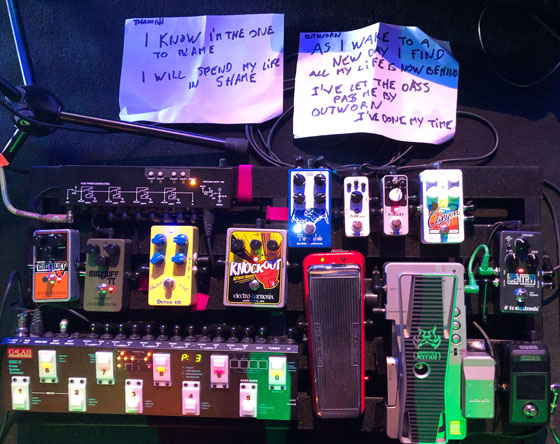
I also use several effects, the two most important in Conviction being the EHX Electric Mistress (I own a small footprint Mooer clone that I dig a lot), and a tap tempo delay (EHX Canyon). Something you will always find on my pedalboard is a Switcher, as I’m not found of tap dancing for changing sounds in the middle of a song. I’ve been a happy user of G-Lab gear for years, notably the GSC-2 and GSC-4.
All of this makes my pedalboard a big and heavy thing, so you will probably find me experimenting, allowing me to reduce my pedalboard’s weight and footprint over the next months. It’s probable that a small and powerful multi effects could replace most of the (non dirt) pedals, and I’m also searching a Big Muff based pedal that allows me to dial mids in.
Olivier: EHX Green Russian is indeed the key to our live sound, and we use them to push the dirt channel of our Orange amps. In my case most of the gain comes from the amp head, the Big Muff is just there to colour the sound, with its sustain near zero and its volume to the max. And to prevent it sounding too muddy and to bring back a little more mids, the Big Muff has itself pushed by my Ibanez TS9, another pedal that will stay on my board forever. Of course all of those together create a huge noise which has to be tamed, with a TC Electronic Sentry.
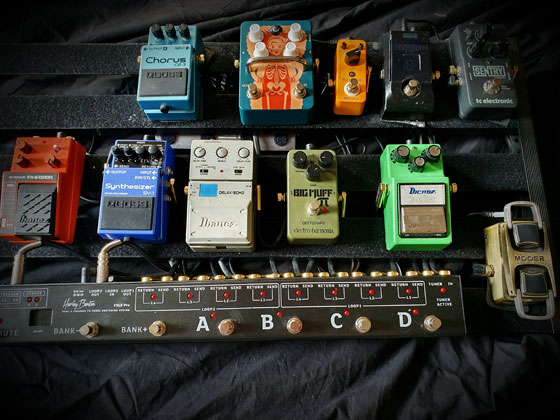
I’m also a big wah user, which currently is a small Mooer The Wahter. I used to have a Cry Baby, but they always ended up having problems, too bad because I think they’re still the best sounding wah’s on the planet. The Mooer is nice & cool and solid though! Another pedal that hasn’t left me since the 90s is my Ibanez DE7 Delay from the Tone-lok series, the echo setting is particularly beautiful. I also use a Boss CE-3 Chorus from 1983 and an Ibanez PH10 Phaser from 1987 I believe, two pedals that are not that hype on the market so they’re still cheap and they sound deliciously warm. I’m quite a phaser maniac. I’ve got a few others, Boss PH2, MXR Phase 90, I had a Digitech one but I seem to have found what I was looking for with the PH10!
Other than that I use a little Mooer Yellow Comp, and sometimes a secondary dirt pedal that can be an Orange Getaway Driver, Fur Coat Fuzz, or Rat, depending on the mood! And since I love weird and psychedelic sounds, I’ve just bought the new Boss SY-1 synthesizer. My switcher is a Harley Benton FXL8 Pro, nice and easy and it does the job pretty well!
Guitars will be an interesting subject since I’ve learned that Frédéric has his own luthier brand, DF Guitars. Can you guys tell me a little about which guitars you’re currently using?
Frédéric: At the moment I’m mainly using two DF Guitar prototypes, one being the first guitar I ever made when learning with a long-time friend and luthier called the Vanir. It’s essentially my own take on the Volcano shape once used by Reverend and now abandoned, and it is an experimental platform for some concepts I plan to include on all my guitars in the future.
The second is called Ulfur, and started as an idea of mixing my two favourite shapes from Gibson, but quickly I also threw in some of my favourite designs from my favourite Japanese models from the eighties. To emphasize this lineage, I used DiMarzio Super Distortion pickups and tainted it red… you can totally imagine someone like Adrian Smith, Phil Collen, or Tom G. Warrior using it.
Olivier: I’ve been using the same Ibanez RG1527 Prestige since 2005. Wonderful guitar, it’s never let me down. I only changed the pickups for DiMarzio Evolution 7, because, let’s face it, the stock ones were weak, but with those fitted, the guitar is a war machine. I also have an Ibanez RGD2127Z which I use as a spare guitar, and a few others, I’m particularly fond of my Fender Classic Player 60s Stratocaster which is heaven for clean sounds.
We’ve been discussing a lot with Fred because I’m planning on having my own DF Guitar in the near future, which will be a 7 string based on the Gibson SG shape, with 24 frets, the same neck profile as my Ibanez, two humbuckers and certainly an Ibanez Edge tremolo… We still have to discuss it a lot, but the idea is slowly growing so you’ll most certainly see the two of us playing DF Guitars sooner or later!
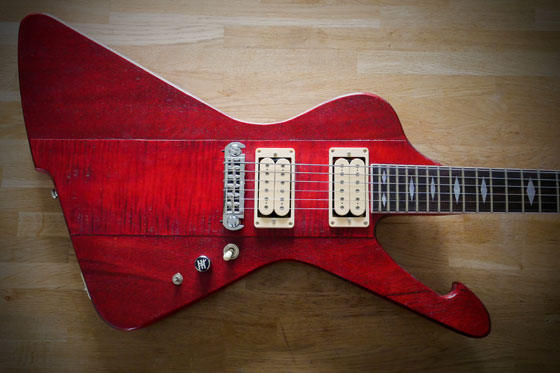
As a luthier, what do you feel is the most important aspect of the guitar and what is a must have in the guitars you build?
Frédéric: Speaking as both a longt ime musician and young luthier, what I care the most of is playability and the sounds I can get from a guitar. Playability starts with a good setup: unlike more ancient instruments, almost everything on a electric guitar is tweakable, so you can have your guitar set to fit your own playing style. The downside of this is you find so many badly setup guitars that they’re barely playable.
Soundwise, as the electronics transduce string vibrations into electricity that feeds the rest of the signal chain, I find its importance crucial. For instance, a good pickup makes a cheap instrument shine, a bad one makes fancy woods and gorgeous looking handmade guitars sound like it’s a cheap beginner’s guitar. Both these aspects affect a lot my way of thinking and designing guitars.
I find its also important to focus on the ergonomics, how is the instrument balanced, how your hands will naturally fit in the right place and you don’t have to put yourself in an uncomfortable position to be able to get your fingers on the right spots. This also affects the way I think the electronic controls layout, especially when guitarists aren’t using half of them on most guitars. What shall remain, what shall go? What to find closest to your hand? 20+ years of gigging as a guitarist gives me some answers that I hope will be relevant.
I have to say I’m enjoying your Self-Titled debut quite a bit, and my current favorite song is Outworn. That intro riff is incredible. What is your writing process when creating such great music?
Olivier: Composing music is quite a magical process really. You just can’t decide ‘OK let’s write a song’. Something has to happen in your mind; in my case for Conviction it’s been mostly very strong emotions I had to let out, in the shape of music. I have to be in the right psychological state. Then, I plug in my guitar, play, and usually after a few minutes an interesting riff pops up out of the blue, which I record straight away on my DAW (Digital Audio Workstation). I then quickly program drums, record a bass line and a second guitar to get a whole band like feel. I let the result ‘talk’ to me, and usually the inspiration keeps on flowing, the rest of the riffs show up as I go.
Sometimes a vocal melody as well, and if I’m lucky, lyrics! Those are tricky though, sometimes they hide for months before reaching my pen. I always write my lyrics with a fountain pen, there’s something with that feeling that can’t be reached with a ball pen or a computer! But if there is the right psychological sparkle, this whole process can give really great results, for example Conviction’s first demo was composed, written and recorded in only one day, it was really strong and intense.
Of course, it’s been made really easy nowadays, with DAWs and plugins. But knowing how to write music is useful, because sometimes a riff can pop in my head while doing everything but music. That’s why I always try to have something to write with me. I’ve composed whole songs on paper this way. Inspiration is a tricky beast.
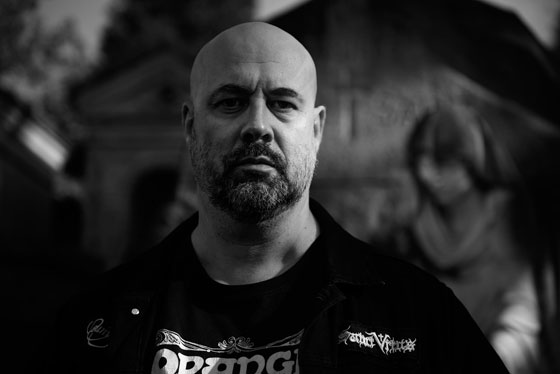
There are a finite amount of notes and an infinite amount of music. How do you create unique music without repeating yourself or others?
Frédéric: Tough question indeed! I’d say that if you span throughout my whole musical career, you will probably find some patterns, things I play that one could tell is my ‘musical personality’. If I happen to find myself too obviously repeating something I’ve done before, it means that I either have to change the way I play it, which can imply for instance a different arrangement, a different rhythm placement, a different dynamic… Or it can be the way the rest of the band plays when I’m stuck on a familiar pattern, which can change everything. But if it’s not working after trying different recipes, then it’s something that should be left behind, or at least until I get fresher ideas.
Olivier: As I said, inspiration is tricky. And sometimes it can just not show up for months. And I sometimes miss that feeling of composing, but I’ve learnt the hard way that it’s useless to force yourself into composing, that’s when you repeat yourself, or worse, you write a near carbon copies of what already exists! I’ve thrown a few songs to the bin because of this… The key, for me, is really not to force it. It will come, and if the feelings are pure, the music will be too. Of course influences cannot be denied, but there’s a difference between being influenced, and musical rip off!
One day I’ll play something on guitar and the next day attempt to play again and it will sound terrible. I’ll get discouraged and stop playing for a little bit. What do you do on off days and how do you get inspired to play again?
Olivier: Sometimes you just have to disconnect. Put down your guitar, and do something different. The guitar is fabulous and it’s a big part of my life, but you have to learn to put it down and let yourself do something else. Go out, breathe fresh air!
It’s weird to say this, but in 2021 people have to learn to go out again, really. We’re all stuck at home, either on our guitars or in front of our computers. OK we feel it even more today because of lockdown, and the virus etc, but honestly when you can, just disconnect from everything and go out, enjoy a ride in the forest for example. You have to enable your body to infuse and distil the music.
It’s the same for people into sports, rest is important between sessions so your body can benefit from the training. I’ve learnt that a lot with the piano also. Not being able to play something I’m working on drives me crazy, for real. And I’ve gone crazy quite a few times in front of that piano, and it’s hard to admit that today it’s not working. I could try something fifty times before errrr… rage and quitting – gamers would laugh!
Then two or three days later, I’d sit at the piano, and play the same thing, and it would flow naturally. It’s the hardest thing admitting you won’t make it. But then, just set your mind on something else, walk in nature, visit an interesting place, watch a good movie, read a good book, let your mind rest and focusing on anything but music. It can have great results.
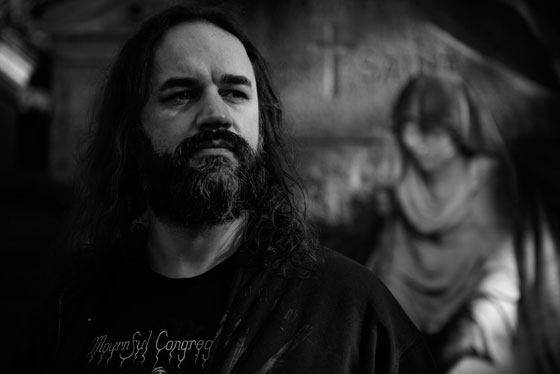
Do either of you have a song, or even part of a song, you’re particularly proud of writing?
Frédéric: As for this album, I found My Sanctuary so inspiring that I asked Olivier to be in charge of the guitar arrangements. I’m very proud of the epicness I was able to bring on this title.
Olivier: My Sanctuary, yes, and for my part it’s the choirs! We’d been working on the demo track for nearly a year actually then all of a sudden I got this choir idea, recorded them on my DAW and sent it to the band, and of course the guys thought it was a brilliant idea. Also, my vocals on Castles Made Of Shame, because it’s the toughest song to sing on the bloody record and I’m very happy with the result! Outworn with the twin guitars at the beginning is another great one, and it’s so bloody simple. Sometimes it only takes one note to give you the thrills, and most often, those are the most intense ones, aren’t they?
What advice would you give a new band starting out?
Frédéric: First of all, learn how to play altogether. I’m not saying in at an individual level, but as a band. Playing in a band is as much about how you listen to your band mates and react to their playing. If your mindset is about how you serve the music, and not your ego, then you’re probably end up doing good things as a band. Music should always come first!
Olivier: Play as much as you can together, rehearse, listen to each others, dissect your songs and work each difficulty separately. And when you can’t play together when you’re at home, especially when you’re starting, use a bloody metronome!!! Tempo is the key; if you lose it you’re dead. Metronome, drum tracks, backing tracks; these days with the internet you have everything, so just use it. Beginning guitar players, accept that you have to start slow, and learn to play riffs and chords at the nice tempo and groove, even before trying to impress your friends with sweeping and tapping!
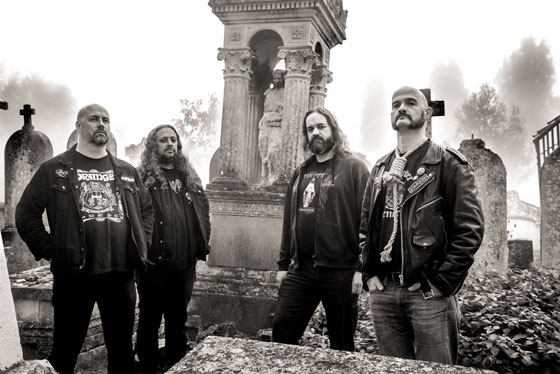
Thanks again to you both for taking time out of your busy schedule to answer my questions. I really appreciate it! Is there anything else you’d like to add?
Frédéric: Thank you for this interview, a genuine pleasure!
Olivier: Thank you very much, I hope all you guitar haters are now reassured to know we hate guitars with same passion as you do – hahaha! Let’s hope we can gig again sometime in the nearest future possible, we miss the stage. See you on our website & social networks, links below.
Conviction’s debut Self-Titled album featuring eight tracks of ‘true doom done right’ is out now via Argonauta Records.
Label: Argonauta Records
Band Links: Official | Facebook | Bandcamp | Twitter | Instagram
Interviewed by: Josh Schneider

